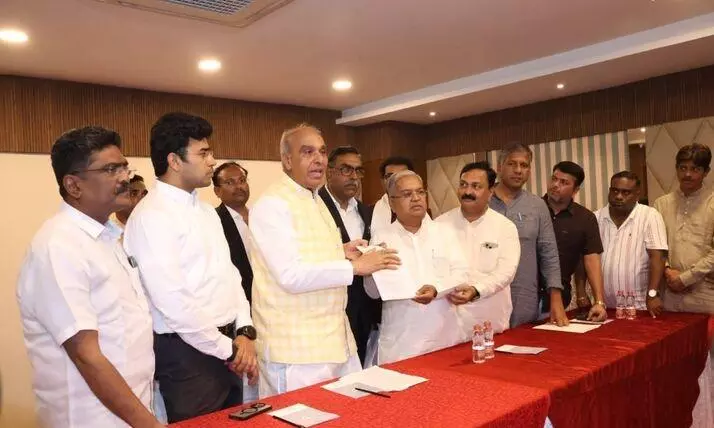
The BJP fact-finding committee constituted to inquire about the Waqf Board's claims on farmers' lands in Vijayapura district presented its report to Jagadambika Pal, chairman of the JPC on the Waqf Amendment Act in Nov 2024. Photo: X | @BYVijayendra
Waqf (Amendment) Bill brings to fore raging 13-year row in Karnataka
While the bill aims to curb Waqf Board powers in land declarations, its impact on affected communities will continue to shape Karnataka’s political discourse

The recent passage of the Waqf (Amendment) Bill in both the Lok Sabha and the Rajya Sabha has reignited a longstanding dispute in Karnataka over Waqf land. While the national debate on Waqf policies has intensified, Karnataka has been at the centre of this controversy for over a decade.
Karnataka’s role in Waqf discourse
The origins of the dispute trace back to 2012, when Anwar Manippady, then chairman of the Karnataka State Minorities Commission, submitted a report alleging corruption and mismanagement in the state’s Waqf Board. The issue resurfaced in 2023 when farmers in Vijayapura district received notices from the Waqf Board, asserting claims over agricultural land that had been granted to them under land reform laws. This led to demands for amendments to the Waqf Act.
Also Read: No farmer will be evicted from their land: Karnataka CM on Waqf land controversy
The controversy gained national attention when Union Home Minister Amit Shah referenced the Manippady report in Parliament, underscoring its implications beyond Karnataka. The state’s BJP unit also organised protests against Waqf policies, particularly the notices issued to farmers, escalating the issue to a nationwide debate.
Dispute’s flashpoint
The dispute reached a boiling point when Waqf authorities issued notices in Vijayapura, claiming ownership over land already distributed to farmers under past land reforms. The move sparked widespread protests, led by BJP MLA Basangouda Patil Yatnal.
In response to the growing agitation, the Joint Parliamentary Committee (JPC) visited Karnataka and listened to grievances from affected farmers. Legal challenges mounted as the Waqf Board’s claims extended to temples, monasteries, crematoriums, and even government land. The backlash was so intense that it resulted in violent incidents, including stone-pelting in Haveri district.
Legal and historical context
A 1974 Karnataka government notification had recognised Waqf Board claims over certain lands. Critics argue that the Board pressured the government to issue this notification. Furthermore, a 1998 Supreme Court ruling in Syed Ali vs Andhra Pradesh Waqf Board reaffirmed that once a property is recorded as Waqf, it remains so indefinitely, regardless of later land reform laws.
Also Read: Waqf board claims 53 ASI sites in Karnataka; ‘took over’ 43 in 2005: Report
Despite this ruling, enforcing Waqf claims in Karnataka has remained contentious. Over the years, attempts by the Waqf Board and state legal departments to implement this decision have led to conflicts, with landowners, including temple authorities, resisting such declarations.
Political repercussions
The Waqf land issue became a political flashpoint, with the BJP accusing the Congress of appeasement politics. The Congress, in turn, criticised the BJP-led NDA government for passing the Waqf (Amendment) Bill, alleging it was politically motivated.
Under the Congress government in 2013, the recommendations of the Manippady report were officially rejected through a 2016 notification. However, when the BJP returned to power in 2020, the report was tabled in the Assembly and Council, though no formal debate ensued.
Controversial Waqf notices
During the tenure of BJP Chief Minister Basavaraj Bommai (2021-22), Waqf notices were again issued to farmers. However, the controversy escalated when similar notices continued under the Congress government in 2023, prompting the BJP to highlight that these notices had first been issued under their own rule.
Also Read: Waqf Board action: Jagambika Pal to meet Hubballi & Vijayapura farmers
Public outrage over Waqf references in land records, particularly in Vijayapura, forced the state government to withdraw the notices and remove Waqf mentions from land documents. Yatnal hailed the passing of the amendment bill as a victory against the Waqf Board’s "arbitrary" actions and credited public protests for forcing legislative changes.
Waqf land leased to foreign entities
During parliamentary discussions, Amit Shah cited the Manippady report, claiming that 30,000 acres of Waqf land in Karnataka had been leased to foreign entities, raising national security concerns. He highlighted the fact that 1,500 acres in Vijayapura had been declared Waqf property, causing administrative hurdles. Additionally, the Waqf Board has attempted to claim rights over religious sites like Datta Peetha in Chikkamagaluru, further intensifying tensions.
Continued impact
BJP state president BY Vijayendra termed the passage of the amendment bill "historic" and accused the Congress of facilitating large-scale Waqf land misappropriations. He alleged that Congress politicians had exploited the Waqf Board to accumulate wealth under its name.
Also Read: Andhra waqf boards struggle with encroachment; will new law bring respite?
With the Waqf (Amendment) Bill now enacted, the issue remains politically charged, with both the BJP and the Congress using it as a battleground in Karnataka’s larger political landscape. While the bill aims to curb Waqf Board powers in land declarations, its implementation and impact on affected communities will continue to shape Karnataka’s political and legal discourse.
(This article first appeared in The Federal Karnataka)

